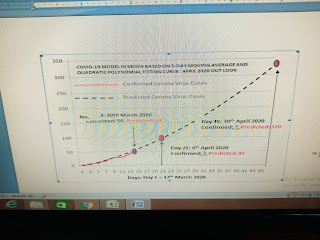Unveiling Killer Routes for COVID-19 or Corona Virus in Kenya
Unveiling the Killer Routes for the COVID-19 or Corona Virus Spread in Kenya
By
Eng. Prof. Sibilike K. Makhanu, Ph.D, MIEK, PE, Masinde Muliro University of Science and Technology, Kenya
The COVID-19 or Corona Virus originated from Wuhan City in China and in a span of less than 90 days has spread to different countries all over the world. The extent and characteristics of its spread has differed in different countries as influenced by historical and circumstantial factors. For instance, Italy has been most affected and analysis of the peculiarity of Italy brings to fore many lessons for other countries to chart appropriate intervention measures. In this article we share the lessons we have learnt from Kenya based on the analysis of the first 25 cases of corona virus spread in Kenya. We identify that Jomo Kenyatta International Airport (JKIA) has been the main gateway for the Corona virus into Kenyan territory. Thus the first killer route is international airspace. From JKIA the other two routes are road travel and domestic air travel. This is followed by gatherings and finally cross border traffic. We analysis below the potential of each route and the necessary intervention measures in order to curtail or limit its spread.
Killer
Route 1: International Airspace
All positive cases
of COVID-19 virus so far have direct link to travellers who passed through JKIA
or those who subsequently came into contact with these travellers. The travellers
have been Kenyan returnees from abroad, visitors to Kenya or those on transit
but had short stay in Kenya. Intervention Measures: The international airspace has been closed with effect from 23rd March 2020. All those
arriving in Kenya are quarantined at a central space or have to self quarantine
for at least 14 days in order to allow the minimum of 5 days period that has
been identified as the incubation period for the corona virus symptoms to show
in a positive patient. Effectiveness:
The effectiveness of these measures that include cooperation by those affected will
be paramount.
Killer
Route 2: Road Transport and Associated Stop-overs
The first positive
corona virus case was traced to a Kenyan returnee who after arriving at JKIA
used private and public transport means to travel to
Killer
Route 3: Domestic Air Travel
From JKIA
passengers have taken domestic air travel to other airports in Kenya such as Mombasa,
Malindi, Kilifi, Kisumu, Eldoret and Garissa. From these domestic airports road
transport route repeats itself as above. Indeed at least two of the positive cases of Corona
virus have been traced to these routes. The case in point is a Deputy Governor
of Kilifi County who travelled from Germany through JKIA to Kilifi and a Priest
who travelled from Italy through JKIA and finally to Siaya
County where he presided over a number of religious functions. Intervention Measures: Though these measures have not been prominently
highlighted, the same standard of measures as those effected at JKIA should be apply to all local airports as well. Effectiveness:
The effectiveness of these measures depends on cooperation of all those
concerned and enforcement measures by the relevant authorities.
Killer
Route 4: Gatherings
Gatherings of
all types will become the main route for transmission of the Corona Virus to
the population masses. These gatherings include official functions, work
places, meetings, conferences, workshops, impromptu gatherings, church
gatherings, open air markets, private functions such as family gatherings, funerals
and weddings. Intervention Measures:
Intervention measures include a ban of these gatherings and its success depends
much on the cooperation and sensitization of the masses and full enforcement. Effectiveness: Since these gatherings
touch on cultural practices, economic activities and other entrenched practices
their elimination or minimization requires much cooperation by the population
and full enforcement of the law, even if use of the military is activated. Indeed there has already been resistance from some quarters who have declined to confirm to precautionary orders issued so far. In some instances the police has had to use tear gas in order to disperse some of these gatherings.
Killer
Route 5: Cross-Border Traffic
Kenya is
sandwiched between five international countries with which she shares her
borders. On the East is Somalia, in the North is Ethiopia, South Sudan is on
the North-West, Uganda on the West and Tanzania in the South. Through Uganda,
Kenya is a transit corridor to the land-locked countries of Burundi, Rwanda,
Central Africa nations and the Republic of Congo. The cross border traffic will
be a major conduit of corona virus as population masses go about their
economic activities. Enforcement of measures and complete control of this traffic will very much depend on the much needed cooperation between law enforcement authorities across borders as well as
cooperation among populations of the neighbouring countries.


On killer route 4:gatherings,,, hot spot targets that need scrutiny are entrepreneurial ventures like saloons, barbershops,, where services beat the logic of social distancing
ReplyDeleteOf curse, once it has entered the country the local transmission routes are very important to study and control. How is that process working in Kenya?
ReplyDelete